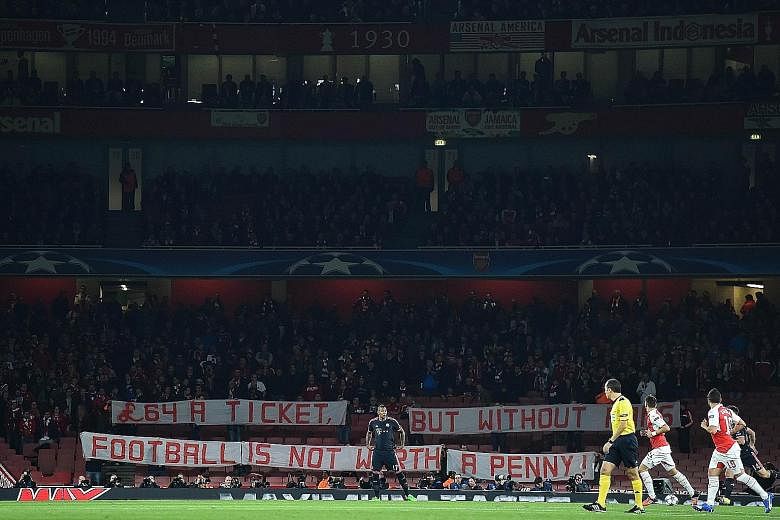"£64 a ticket, but without fans football is not worth a penny" - the banner, and the temporary emptiness of 300 or so seats in the stadium said it all.
From afar, those of you who have to buy into the European culture of football through paying heavily to view games on television might wonder if those fans at the Arsenal v Bayern Munich match on Tuesday night have any appreciation of how privileged they are.
But read between the lines.
The spectators who stayed out of Arsenal's stadium for the first five minutes of the Champions League game were Bavarians.
They had paid rather more than the S$137 entry price on their tickets. With fees and postage added on by Arsenal, and with travel from Munich to London, every man, woman or child who followed their team to the Emirates Stadium would have had to find closer to S$400 to be there.
(The experience of watching their Reds go down for the first time in any game this season was just that - a new experience because prior to the goals from Olivier Giroud and Mesut Oezil, Bayern had beaten every opponent they encountered this season, scoring 40 goals and conceding just five along the way.)
That, as they say, is sport. Win or lose, a fan is a fan, very often for life.
I find it astonishing in this day and age, when television income from around the world dwarfs the price of admission to the stadiums, that a club with the name and reputation of Arsenal assumes the right to fleece fans with the highest ticket prices in England, and higher by far than Germany.
The £64 is close to three times what Bayern supporters pay to watch what is by any measure one of the best sides on earth.
Small wonder that Arsenal's near-60,000 paying customers roundly applauded the dignified protest in their palatial London home on Tuesday.
This is the price the Gunners faithful pay every home game, regardless of the fact that their club now have over £200 million (S$432 million) in the bank that Arsene Wenger finds hard to spend.
He was given a hard time by shareholders recently because, while the fans think he should go out and buy, say Thomas Mueller or Robert Lewandowski, they seem perfectly content to remain Muencheners for the time being.
Wenger's argument is that he will only spend fortunes on players who are better than what he has at the Emirates. And on Tuesday, maybe for one night only, his present collection got the job done against Bayern.
But this isn't another defence of Monsieur Wenger.
It is a more widespread look at the way fans, true fans who have no other team to follow but the one they often are born and bred to follow through thick and thin, are treated.
Clubs milk them dry. I hear glib answers about market forces, and the mantra that the Premier League must be doing something right because the stadiums are mostly full.
They are, and Arsenal are in the happy position of being a London club so that, if a fan doesn't like, or doesn't have, the price of admission there are plenty of visitors willing to buy the ticket.
That's true, and it's also ugly, myopic market forces.
I know an American lawyer who, while passing through London, paid seven times the face value of admission to The Emirates. He just wanted to sample the atmosphere, to say he'd been there. For all I know, he worked the entry fee through his expenses anyway.
But he and his kind probably contribute to what Arsenal sometimes complain is such a quiet audience that the stadium has been dubbed The Library.
I would argue that if the lack of passion, noise and commitment work their way through the TV feed then it takes something away from YOUR experience too (assuming you do not wish to sit, and pay, to watch football being played in a vacuum).
The other line we hear is that the price of entry is governed by market forces. Arsenal are American-owned, and another American suggests: "It's the same as the theatre, if you wanna be entertained, you pay the asking price."
The argument is shallow. Yes, a London West End theatre ticket would set you back roughly the same as getting into an Arsenal game. But theatre is, for most people, a much rarer pleasure than the weekly commitment of fans to their football team.
The Bayern protesters put the valid argument that Arsenal's pricing structure makes it impossible for young and socially disadvantaged fans to visit the stadium. "It destroys fan culture... and, with that, the foundations of football," said the protest group.
Bayern supporters who travelled to Olympiakos in Piraeus, Athens, were asked to pay around S$77, and even in Zagreb, where Dynamo supporters can watch for S$6, the visiting Bayern fans will be asked for 10 times that amount.
The Munich group making a stand against this could of course appeal to Uefa, the ultimate ruler of football in Europe - and the banker of Champions League riches.
Uefa might not necessarily be receptive.
Its leader, Michel Platini, is suspended while he tries to explain how he received almost S$3 million from Sepp Blatter without any contract being written up.
Platini's stand-in as Uefa president, the Spaniard Angel Maria Villar Llona, is also under investigation in the great Fifa financial mess.
But Uefa does find the time, and the busybodies, to charge Manchester City because the club's fans on Wednesday booed their way through the Champions League anthem.
"Uefa have opened disciplinary proceedings for the disruption of the competition anthem," a statement read. "The disciplinary body will deal with this case on Nov 19."
Fans taking the pomp out of an organisation whose officials are accused of taking money by false pretences? Europe's political leaders might have something to say about freedom of expression, and free speech for the common fan.


